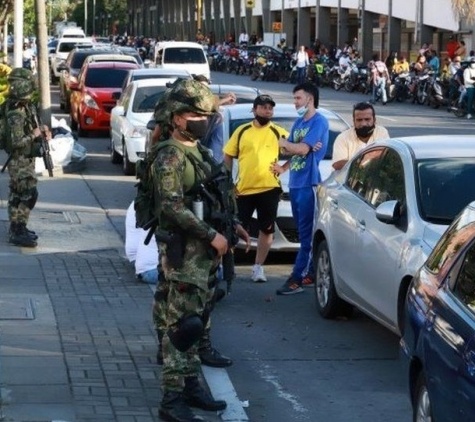
Mia Costales | News Editor
May 13, 2021
On April 28, tens of thousands of Colombian protesters took to the streets, protesting a government tax reform. This tax reform, introduced by right-wing President Iván Duque, aimed to raise around $6.3 billion to eliminate deductions and exemptions, expand taxes on individuals and businesses, apply sales tax to more products, and increase taxes on low and middle income citizens. This tax reform coupled with COVID-19’s impact on the financial stability of working class people has pushed many to show discontent for the way the Colombian government has run the country.
Duque withdrew the tax reform soon after protesting started, as they became deadly. According to Colombia’s human rights ombudsman, forty-two people have been killed and the number is steadily rising. However, Duque’s tax reform withdrawal hasn’t stopped Colombian citizens from protesting. The police and military have only fueled the anger of protesters as videos have shown anti-riot policemen combatting the crowds of people with tear-gas and batons. Police brutality is yet another reason for Colombians to rise up against those in power. And tensions between the police force and the protesters are rising as Bogotá Chief of Police Oscar Antonio Gomez Heredia revealed that protesters had attacked 25 police stations.
“What is happening in Colombia right now is extremely wrong, and I stand with the protesters. The proposed bill would have made so many Colombian citizens fall below the poverty line and leave the wealthy untouched,” senior Emily Chiani said. “These people had every right to protest against this. Police brutality has taken so many lives in Colombia this week and Iván Duques should continue to do more to stop the police and military from killing so many protesters, as taking down the tax reform was not enough.”

These riots are an eye-opener for many, as they’ve forced government officials to address the economic inequality Colombia has faced for years. Bogotá Mayor Claudia López Hernandez has called for Colombia to address the extreme poverty and unemployment plaguing the country. Around 27% of Colombian citizens live in poverty (36% in rural areas), and 7% are living in extreme poverty and lack life essentials. As the protests continue, barricading may create food shortages, causing yet another problem for the impoverished.
“I think it’s terrifying that their own government could become so corrupt that demonstrators would go as far as to make barricades that might create food shortages just to get their point across. I also think it’s terrifying that lots of human rights groups are becoming increasingly concerned with the amount of unknown injuries and deaths everyday,” senior Marysol Acosta said. “It’s unfortunate how all of this could happen in a span of just a few days creating mass chaos. I wish I could do something to help directly other than just becoming informed every day of what’s going on.”
It seems as though the protests won’t be stopping any time soon. President Duque has attempted to reason with protesters and urges Colombian citizens to engage in a “national dialogue” about ongoing events. Protests are predicted to continue into the next couple of weeks and Duque has ordered military assistance for cities at high risk for disturbance.

Leave a Reply